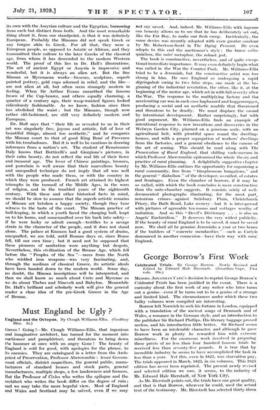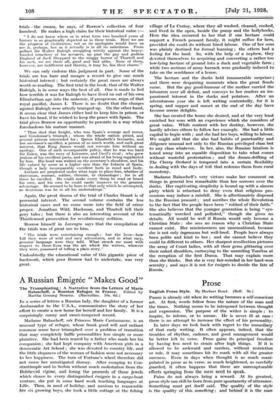George Borrow's First Work
MESSRS. JONATHAN CAPE'S decision to reprint George Borrow's Celebrated Trials has been justified in the event. There is a curiosity about the first work of any writer who later turns out a genius—even if he turns out to be a genius of a strange and limited kind. The circumstances under which these two bulky volumes were compiled are interesting.
Borrow left Norwich to seek his fortune in London, equipped with a translation of the ancient songs of Denmark and of Wales, a romance in the German style, and an introduction to the publisher Sir Richard Phillips. His literary baggage proved useless, and his introduction little better. Sir Richard seems to have been an intolerable character, and although he gave Borrow work in plenty he rewarded him with extreme miserliness. For the enormous work involved in preparing these precis of no less than four hundred famous trials he received less than seventy-five pounds. It is true that by incredible industry he seems to have accomplished the task in less than a year. Yet this, even In 1825, was starvation pay. The trials appeared in March, 1825, in six volumes. This 1825 edition has never been reprinted. The present newly revised and selected edition we owe, it seems, to the industry of Mr. Edward Hale Bierstadt, of New York City.
As Mr. Bierstadt points out, the trials have one great quality, and that is that Borrow, wherever he could, used the actual text of the testimony. Mr. Bierstadt has selected thirty-three trials—the cream, he says, of Borrow's collection of four hundred. He makes a high claim for their historical value :- " I do not know where or in what form two hundred years of history is so graphically depicted as in these trials. Here we see the progress of civilization, not as its apologists would have us see it, perhaps, but as it actually is in all its nakedness. From gallant Sir Walter Raleigh struggling wittily against the heavy. handed treachery of his accusers, up past the gay and godless England of Jack Sheppard to the muggy horror of Thurtell and his sack, we see them all, good and bad alike. None of them, however, are indifferent and therein, it may be, lies their charm."
We can only endorse this judgment in part. Some of the trials are too bare and meagre a record to give one much historical interest ; but certainly the great cases are always worth re-reading. The first trial in the book, that of Sir Walter Raleigh, is in some ways the best of all. One is made to feel how terrible it was for Raleigh to have lived on out of his own Elizabethan age into the unheroic, if prosperous, reign of that royal pacifist, James I. There is no doubt that the charges against Raleigh were utterly trumped up. On the other hand, it seems clear that James either had to keep him in prison, or have his head, if he wished to keep the peace with Spain. The trial gives Borrow an opportunity to perorate in a way which foreshadows his mature manner.
" Thus died that knight, who was Spain's scourge and terror, and Gondomar's triumph ; whom the whole nation pitied, and several princes interceded for ; Queen Elizabeth's favourite, and her successor's sacrifice, a person of so much worth, and such great interest, that King James would not execute him without an apology. One of such incomparable policy, that he was too hard for Essex, was the envy of Leicester, and Cecil's rival ; who grew jealous of his excellent parts, and was afraid of his being supplanted by him. His head was wished on the secretary's shoulders, and his life valued by some at a higher rate than the Infanta of Spain, though a lady incomparably excellent both in mind and body.
Authors are perplexed under what topic to place him, whether of statesman, seaman, soldier, chemist, or chronologer ; for in all these he excelled. He could make every thing he read or heard his own, and his own he could easily improve to the greatest advantage. He seemed to be born to that only which he attempted, au dexterous was he in all his undertakings."
- Again, the great drama of the trial of Charles Stuart is of perennial interest. The second volume contains the less historical cases and we come more into the field of crime proper. Jonathan Wild, Hackman, and Thurtell tell their gory tales ; but there is also an interesting account of the Thistlewood prosecution for revolutionary sedition.
Borrow himself in Lavengro says that the compilation of the trials was of great use to him.
" The trials were entertaining enough ; but the lives—how full they were of wild and racy adventures, and in what racy, genuine language were they told. What struck me most with respect to these lives was the art which the writers, whoever they were, possessed of telling a plain story."
Undoubtedly the educational value of this gigantic piece of hackwork, which poor Borrow had to undertake, was very great.





















































 Previous page
Previous page